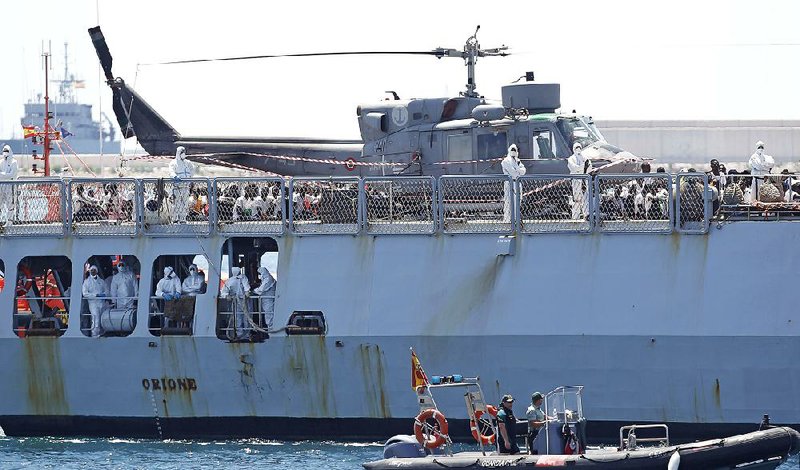VALENCIA, Spain -- An aid group's ship and two Italian military vessels docked Sunday at the Spanish port of Valencia, ending a weeklong ordeal for hundreds of people who were rescued from the Mediterranean Sea only to become pawns in a European political fight.
The Italian coast guard vessel Dattilo was the first of the boats in the convoy bearing 630 migrants to touch land, pulling in just before 7 a.m. The 274 rescued people on board disembarked after medical staff made a preliminary inspection.
The rescue ship Aquarius came in four hours later carrying another 106 migrants. Aid workers awaiting their arrival clapped and cheered as the first passengers walked down the gangway. Another Italian navy ship, the Orione, came in shortly after 1 p.m. with the remaining 250.
The Aquarius, operated by the aid groups SOS Mediterranee Sea and Doctors Without Borders, was stuck off the coast of Sicily on June 9 when Italy's new populist government refused it permission to dock and demanded that Malta do so. Malta also refused.
The landing in Spain opens a new chapter in a saga that began June 10 when Italy's new populist government followed through on anti-immigration campaign promises by refusing to let the Aquarius dock at an Italian port.
Italy's interior minister and the leader of the anti-immigrant League, Matteo Salvini, had argued that "an army of fake refugees" had long exploited what he called the country's lax rules.
That left the ship, which at the time was overburdened with the rescued migrants, stranded at sea in dangerous conditions.
The migrants will be granted a special humanitarian permit to stay in Spain for 45 days while authorities review their cases and give them medical attention. The Spanish government said it would review all of the 630 migrants' cases to decide whether to grant them asylum. Those who do not fulfill the criteria would face deportation.
David Noguera, the head of Doctors Without Borders in Spain, said he was glad Spain welcomed the ship's passengers, who were picked up off the coast of Libya. He said he is worried that more European nations will close their ports to migrants who are rescued at sea.
"I have mixed feelings," Noguera said as the first boat arrived in Valencia. "I am happy that the journey [for the Aquarius migrants] is over -- a journey that was too long -- and I am worried for the situation in the Mediterranean and the closing of European ports."
The migrants were met by emergency workers, health officials, Red Cross volunteers and psychologists at the city's marina. Each was assigned to a translator, and authorities worked to determine their identities before they were sent to welcome centers.
The first person through the process was a 29-year-old man from South Sudan.
In total so far, there were 31 different nationalities represented, with the largest numbers of people coming from the Sudan, Algeria, Eritrea and Nigeria, according to Spanish authorities. There were also 68 minors, 46 of them traveling without an adult family member.
Valencia emergency official Jorge Suarez said some of the migrants were in a state of shock.
"They are very shaken," Suarez said. "Put yourself in their position: You get off a ship and the first people who greet you are wearing masks."
Physical exams did not reveal any serious health problems, but many passengers showed signs of exposure to high temperatures. A total of 144 were taken to hospitals for treatment of minor health issues.
David Beversluis, the chief Doctors Without Borders physician on the Aquarius, said several of the rescued women were victims of sexual violence and rape.
In Germany, Interior Minister Horst Seehofer is calling for Germany to turn back at its border migrants who have registered as asylum-seekers in other European countries. Chancellor Angela Merkel opposes unilateral action, arguing that it would weaken the 28-nation European Union. The issue has escalated into a high-stakes power struggle.
Seehofer leads the Bavaria-only Christian Social Union party, the sister party to Merkel's conservative Christian Democratic Union. His party holds a leadership meeting today which could authorize Seehofer to push through his demand.
If he actually does so unilaterally in defiance of the chancellor, many observers believe Merkel would likely have to fire him -- which in turn could effectively end her current governing coalition and the conservative parties' decades-old alliance in national politics. The two parties govern with the center-left Social Democrats.
"No one in the CSU has an interest in bringing down the chancellor, dissolving the CDU-CSU joint parliamentary group, or blowing up the coalition," Seehofer was quoted as telling the Bild am Sonntag newspaper. But "we want finally to have a sustainable solution for turning back refugees at our borders."
Information for this article was contributed by Renata Brito, Iain Sullivan, Joseph Wilson, Frances D'Emilio and Geir Moulson of The Associated Press and by Raphael Minder of The New York Times.
A Section on 06/18/2018
